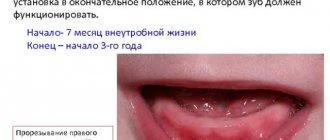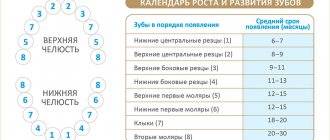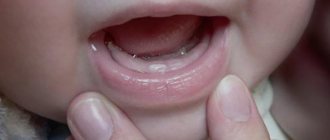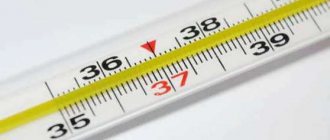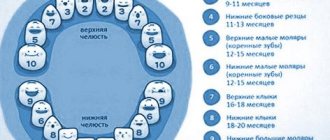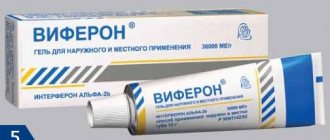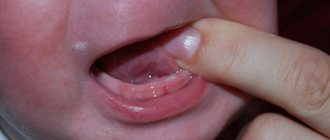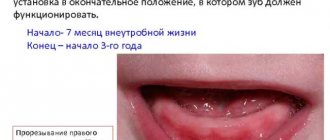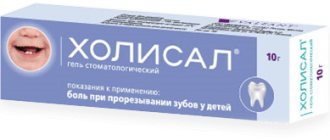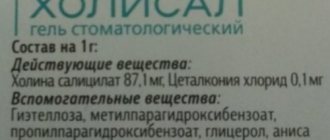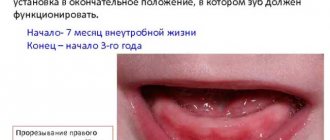The formation of baby teeth is a stressful situation for a baby, to which his body usually reacts with an increase in body temperature. Of course, this happens not only because of teething. It will be useful for many parents to know what to do when their baby suddenly has a fever.
What causes body temperature to rise during the formation of baby teeth?
There is a misconception that a child’s elevated body temperature during the eruption of baby teeth is not normal and therefore measures should be taken to lower it to a normal level. In fact, this is not so. The fact is that at the site of tooth eruption, the body’s immune defense decreases. Harmful bacteria enter the disturbed gum and cause an inflammatory process, which is always accompanied by an increase in body temperature. It should be understood that elevated temperatures have a detrimental effect on harmful microorganisms. Of course, this does not mean that excessively high temperatures during teething are normal.
Parents of the baby should not worry if, during the formation of baby teeth, the baby’s body temperature does not exceed 38 degrees.
In one-year-old babies, the process of tooth formation is much more complicated. It is after the first year of life that a child’s canines and molars begin to form. These teeth erupt much more slowly and, accordingly, increased body temperature can persist for a long time. Their long formation is explained by the uneven shape of the molars and their size. Sometimes it lasts several weeks.
The same situation occurs during the eruption of eye teeth. Their roots are located much deeper than the rest of the baby's teeth. Therefore, the growing eye tooth has to travel a longer path to the gum surface. All this time, the child experiences discomfort, and his body responds to it with an increase in body temperature.
In essence, the emerging baby teeth tear the soft tissue of the gums, and this cannot be painless. In this place, the immune defense is weakened due to injury. During the formation of molars, children often develop a fever. This happens when the impact of harmful microorganisms becomes too powerful, that is, an infectious infection has occurred. In this case, the body temperature rises to 38 degrees, and sometimes above.
What reaction is possible for a baby when teething?
What reaction can a child have when baby teeth appear? During this period, children may react in different ways:
- Some children tolerate this period quite normally. The only symptom that worries them is itching in the gums, increased salivation and a slight increase in body temperature.
- Other babies react very hard to teething: the temperature may rise to 38-39 degrees, they do not sleep at night, and refuse to eat.
- There are also little ones who are luckier than others: their teeth appear without any problems and almost imperceptibly.
What is the maximum permissible body temperature of a child during the formation of teeth?
How high a baby's body temperature can rise depends on the condition of his body. During teething, a normal body temperature is considered to be between 37.5 and 37.7 degrees. The maximum permissible temperature is 38 degrees. If it increases further, then measures should be taken to reduce it.
Parents should remember that during the period of formation of baby teeth, the child’s body temperature should be measured more often.
If the child’s body temperature reaches 39 - 40 degrees, this means that urgent medical attention is needed, since, most likely, the infection has penetrated the baby’s respiratory system.
Teething: how to help your baby
This may require a fair amount of patience. During such a difficult period, you should take the baby in your arms more often, caress him, distract him from unpleasant sensations with toys, turn on pleasant, soothing music, and you can sing if natural abilities allow. A walk in the fresh air can also have a calming effect. Children who are breastfed, during teething, begin to cry more often and ask for the breast, and a loving mother needs to be patient, putting the baby to the breast every time, even if he grabs the nipple areola harder than usual during feeding. To satisfy the child’s need to chew something and hold something in his mouth, you can naturally use special rubber rings or toys, so-called teethers. You can offer your child dry food or baby cookies.
Currently, pharmaceutical companies offer a wide range of different products, primarily in the form of gels to “soothe the gums.” In general, most of these products contain painkillers such as lidocaine. You should not abuse these funds. They are not completely harmless; the anesthetics they contain can have an adverse effect on the child’s nervous and cardiovascular systems, and most importantly, they can cause serious allergic symptoms and contribute to the exacerbation of atopic dermatitis (diathesis) in children prone to allergies. In connection with the above, I can recommend, to reduce swelling and inflammation of the gums during teething, such special dental anti-inflammatory drugs for topical use as Cholisal gel, which can be applied to the baby’s gums 2-3 times a day, but must be rubbed in (not too much). of course) with light massaging movements over the entire surface of the gums, and not just putting it in the child’s mouth.
In addition, you can give a child suffering from teething special homeopathic drops, for example Dantinorm baby, according to the instructions for the drug. In any case, if the disturbing symptoms described above in this article appear, I advise you to play it safe once again and call a pediatrician to the home of a child with a high fever. A professional should give his diagnosis and recommendations.
How long can an elevated body temperature remain?
There is no clear answer to this question. It all depends on the health of the baby. As for the results of long-term observations, on average, the increased body temperature of a child during the formation of baby teeth persists for one to three days. It is important to note that when the top of the tooth appears above the surface of the gum, body temperature returns to normal. This happens as each tooth erupts.
However, statistics show that in some children, elevated body temperature persists for four or even five days, and the fever can last only a few hours and go away on its own.
Knowing all of the above does not mean that parents should not show their baby to pediatricians. An extra examination by a specialist will never hurt, but, on the contrary, will help identify diseases at the earliest stage of their development.
How to measure temperature correctly
Before giving your daughter or son any medicine, you should make sure that the temperature has actually risen.
Thermometers help measure it, so they should be in your home medicine cabinet. The following methods can be used:
- 1. Use a regular glass mercury thermometer. And although this method is considered not fashionable today, it shows the most accurate numbers.
- 2. An ear thermometer is a good device for very young children, since you can get the result in just a few seconds, and no contact with the skin is required.
- 3. Digital ones are not as accurate as classic ones, but they are especially popular with parents of all ages.
- 4. Frontal ones are most often found in large clinics. This is very rare in home practice.
- 5. Thermometer - the pacifier will be an ideal assistant for mothers and fathers if the child is not yet a year old.
Each of the presented options works differently. Therefore, before you start using it, you should read the instructions.
What symptoms can accompany high temperature?
During the period of teething, in addition to elevated temperature, the child may exhibit other symptoms. Often at this time, swelling of the gums occurs, which can reach the mucous membrane of the nose. This phenomenon is accompanied by a runny nose and copious discharge of clear fluid from the nose. Swelling most often occurs when the baby's upper teeth erupt.
If the elevated body temperature persists for five days, then you should immediately call a doctor.
You should also know that during teething, babies produce copious amounts of saliva. It is especially pronounced when the lower teeth erupt.
Reasons for the increase
A child does not develop a high temperature without a reason.
However, it is very difficult for parents to find the cause at home. It is for this reason that it is advisable to show the baby to the pediatrician. The most common reasons are:
- 1. Colds and viral diseases.
- 2. Intestinal infections.
- 3. Inflammatory diseases of internal organs.
- 4. Pneumonia and other lung diseases.
- 5. Inflammation of the ears, especially otitis media.
- 6. Sore throat.
At the same time, parents need to understand what a normal temperature value is. The average human body temperature remains at 36.6 – 36.9 degrees. Anything below this figure is called hypothermia. Anything higher is hyperthermia. This indicator is also classified according to another scale, which is often used by doctors.
Low-grade fever is in the range of 37 – 37.9. This is followed by febrile, which starts from 38 and ends at 38.9. If there are higher numbers on the thermometer, then it is already paretic, and above 41 degrees is called hyperpyretic.
Warning symptoms
During the period of teething, the child’s body is weakened and therefore more susceptible to viral or bacterial diseases. At this time, you need to monitor your baby with maximum attention. You should seek help from a doctor if you have the following symptoms:
- The baby's nose is very stuffy and a purulent substance is released from it. Such signs indicate the likelihood of rhinitis, which can only be cured with medication.
- The appearance of diarrhea does not mean that it is directly related to teething. Most likely, an infection entered the child's stomach through toys or a gum teether. The baby should be shown to a doctor.
- During teething, the baby's mouth produces copious amounts of saliva. The child does not always have time to swallow it, and this causes him to cough, or rather, cough. If the cough becomes prolonged, this means that the baby’s respiratory system has become infected. You can’t do this without the help of a doctor.
- It should also be taken into account that teething cannot cause redness in the throat. If this happens, it means that the child has pharyngitis or a general respiratory disease.
- Vomiting at elevated body temperature during teething is an alarming signal. This happens when the nervous system is damaged or due to an intestinal infection. Calling a doctor in such a situation is mandatory.
All of the above symptoms are alarming, even if they appear without elevated body temperature.
Child's body temperature when replacing baby teeth with permanent ones
During the period of loss of baby teeth and the appearance of permanent teeth, the child’s body temperature remains normal. Only some children's body temperature rises when permanent molars begin to form. The reason for this is the size and shape of the molars.
Typically, children's first permanent teeth begin to form at the age of six. If at this time the child’s temperature rises, then there is a possibility of gingivitis. This disease is characterized by inflammation of the mucous membrane of the gums and requires treatment.
How should parents behave when their child’s body temperature rises?
Many parents, having discovered an increase in the child’s body temperature during the period of teeth formation, try to bring it down with antiviral or antipyretic drugs. Meanwhile, there is no need to rush in such a situation.
A body temperature within 37 degrees should not cause anxiety in parents, since this is the norm during teething, and more precisely, a normal protective reaction of the body. In such a situation, you just need to wait until the body itself copes with the pathogenic microorganisms that have penetrated it.
However, if the body temperature exceeds 38 degrees and the baby experiences attacks of fever, it is advisable to use antipyretic drugs. If this does not help, then the baby should be wrapped in a diaper soaked in a weak vinegar-alcohol solution or simply moistened with cool water.
If high temperature and fever attacks occur for three days, then a medical examination of the baby is necessary. He probably developed some kind of disease that had nothing to do with teething. It is allowed to use homeopathy instead of antipyretic drugs. These drugs cannot reduce body temperature, but at the same time significantly improve the general condition of the baby. This in turn contributes to a speedy recovery. However, the use of homeopathic medicines without the approval of a pediatrician is unacceptable.
How long does the temperature last
During teething, the temperature rises on average to 37.7°C. This has practically no effect on the general condition of the child. He is active, eats well, plays. But hyperthermia can also reach high numbers - 39-40°C. In this case, the baby is lethargic, capricious, and refuses to eat. It is better to take measurements every 1-2 hours. If the increase is critical, an antipyretic drug should be given. Normally, the temperature during teething can last up to three days. If hyperthermia is present even on the 4th day, you cannot do without the help of a doctor.
Will walking during teething be harmful?
If during the period of teething the child’s body temperature does not exceed 37 degrees, and the baby himself does not suffer much from this, then walks will benefit him. In such a situation, the baby should be dressed for the weather and walked with him away from people to avoid possible infection. You should not get involved in active games at this time.
If the baby’s body temperature has risen above 37 degrees, and he himself does not feel well, then it is better to refrain from walking until he recovers.
In conclusion, let us remind you that self-treatment of children is always fraught with bad consequences. Do not hesitate to contact your doctor again.
